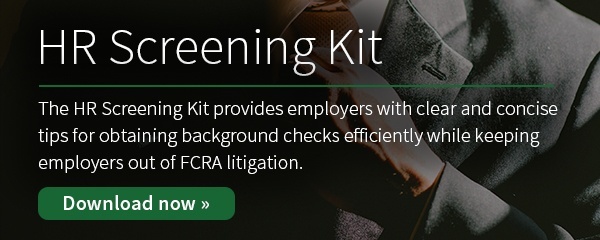What’s with all the jargon? Background Check Terms and Definitions

As with any industry, terminology matters. Background check jargon can be challenging but it is helpful to have a basic understanding of some terms. A professional background screening company will also guide hiring managers, property managers and non-profit organizations through the process, pointing out ways to save both time and money. Background checks prior to employment (or during), before renting to a tenant, or hiring a volunteer is important to hiring and placing quality individuals but efficiency counts too.
Manage risk, save time and money with this list of jargon, terms, and definitions behind background checks.
Background Check Terms and Definitions
Adverse Action
Adverse action is applicable in both employment and tenant screening. If an employer or property manager's decision is influenced by problems on the background check, they must follow adverse action procedures.
- Before taking adverse action, the employer or property manager must provide the applicant with a copy of their background check report, a summary of their rights under the FCRA, and allow the applicant to dispute any inaccurate information.
- If the information stands as correct, the individual must be informed that adverse action will be taken.
Authorization and Disclosure
Any individual who will be screened must give authorization and consent via a disclosure agreement.
Consumer
A consumer is the individual who will be screened for employment, volunteer work, or as a potential tenant.
Consumer Report
A background check may also be referred to as a consumer report, screening reports, or investigations. Depending on the background check reports that are requested, this document may contain information such as credit standing, payment history, driving records, criminal record history, education and employment history.
Investigative Consumer Report
In the state of California, background checks are also called "Investigative Consumer Reports". Otherwise, these background checks may dive deeper into an applicant's history to include interviews with references and former employers.
Consumer Reporting Agency (CRA)
Background check companies compile information on behalf of employers and property managers to create consumer reports and are often referred to as consumer reporting agencies (CRA). CRAs request uniquely identifiable information on the individual to obtain accurate data.
Credit Report
A credit report is a compilation of an individual’s credit history. The data included on a credit report could be payment history, bankruptcies, and outstanding balances and may be included in a consumer report. Credit Reports are obtained from credit bureaus such as Transunion, Experian or Equifax and may be used in a hiring or property management rental decision.
Dispute
If any data obtained in a consumer report is false or inaccurate, the individual consumer has a right to dispute the information. Once the dispute has been proven correct, the data must be changed or deleted for accuracy. The individual must also be provided an updated report from the consumer reporting agency.
End-User
The end-user is the party requesting a consumer report from a CRA. An employer, landlord, property manager, or other business owner (end-users) would be obtaining a background check for the purpose of hiring, renting a property, or volunteer work.
Fair Credit Reporting Act (FCRA)
The FCRA is a federal law that regulates the "collection, dissemination, and use" of information gathered on individuals. CRA's must adhere to this law when running background checks for end-users such as employers or property managers.
Federal Trade Commission (FTC)
The Federal Trade Commission oversees CRA compliance with the Fair Credit Reporting Act to ensure consumer information and privacy are protected.
Permissible Purpose
When an end-user requests a consumer report, the FCRA states they must have "permissible purpose" for requesting the information. Hiring an employee or placing a tenant are considered "permissible purpose".
Summary of Rights
Consumers are made aware of their FCRA rights via this document from the Federal Trade Commission. At the time an end-user sends a copy of a consumer report to a consumer, the "Summary of Your Rights under the Fair Credit Reporting Act" document is also included. These rights include the ability to dispute inaccurate information and limits the use of the data unless the end-user has "permissible purpose".
Share this
You May Also Like
These Related Stories

What are Consumer Rights During Background Checks?

Update: What Landlords Need to Know About Screening Tenants

